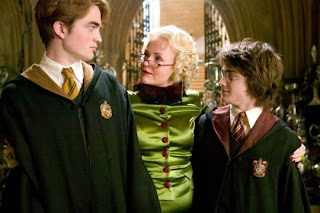The articles from the Rocky Mountain News (sadly there was no coffin for this fallen soldier) are a difficult read. This isn't because of some lachrymose nature on my part, but because anybody with a heart beating in their chest will find it torn asunder by these detailed accounts of fallen soldiers and the people they left behind.
The one I found most interesting and thought to be well written was the Part 2 in which we are introduced to Lt. Beck and are simultaneously given a quick history of the Marines way of notification and a harrowing portrait of a man who never signed up for this but has a sense of duty that compels him to do the job to his best abilities.
"Beck looks like the job: hard and soft. His white cotton gloves cover calloused hands. They lead to thick, regular-guy arms shaped by work instead of weightlifting, and a round, pale face with big cheeks that turn red when he hasn't had enough sleep, which is most of the time."
There's a quality to Jim Sheeler's writing that makes it read more like prose than journalism. I'm always fascinated by this style of writing. I find it to be very interesting but difficult to actually replicate. Trying to draw the line between the truth and my own interpretation in descriptions is tough for me. I've had a lot of training in writing the bare facts and inversely in creative writing classes I've trained in writing like fiction is true fact but when I try and combine the two style I find it messy and not quite right, like putting bacon in your ice cream.
Something should also be said of Sheeler's tactful leads. Almost everyone except for a few are one short, taciturn sentence. Sometimes they're slightly poetic and sometimes they're frank and to the point like the lead for Part 7: "Casualty notification isn't always conducted with the same care." That was another that was hard to read not just for the sadness that hung over every part of the story but because you knew that these people had to go through an extra inch of indignation after losing their loved ones due to some carelessness or red tape snafu on the Army's part.
This writing is beautiful, heavy, poetic and sparse. The story is also informative, fair and doesn't push a political stance on the subject. It's everything good writing should be and it's everything great journalism should be. I'd list it as the best of all the blog readings so far.
Now for a field recording of a man walking around Arlington cemetery with bagpipes in the background.
Tuesday, November 30, 2010
Sunday, November 21, 2010
Portrayals of Journalism in Harry Potter

Harry Potter is huge. No denying it. No need to. It's a part of almost every kids life who was born between 1985-1993. We grew up with that little squirt until he turned into the brooding teen he is now. So it only makes sense that I'd find a way to tie into my Journalism blog and Rita Skeeter is that way!
Let's go over a quick recap of who Rita Skeeter is in case your lame and do know your Harry Potter characters. She's the snooping, bespectacled chatterbox who is always pushing her own agenda in interviews. Generally, she's a stereotype of a character who is used to pester Harry constantly and remind readers of how reluctant he is to be as famous as he is. In the last book she pours salt on his wounds by writing a tell all about Albus Dumbledore shortly after his death.
What's really interesting is how she contributes to the archetype of the skeezy journalist who will do whatever it takes to not only get the story (she turns into a beetle to eavesdrop on people) and will often manipulate the truth to make her story more interesting. Why do writers choose to portray Journalists in such a way? I mean ournalists and writers are like cousins!
Because its easy is why. Watch any cop show and see how they portray journalists. Along with the slimy politician (that's ones true though) it's just an easy trope to use. One wonders if these stereotypes are damaging to journalists as a whole. They could portray journalists as conniving and jingoistic. For the most part, there's enough positive portrayals of Journalists in the media (think Spider-man) to balance it out. Also, I feel like the ever changing journalistic job market is something of more concern. So in conclusion, Harry Potter's Rita Skeeter si just a harmless little 2D character in an awesome book series.
Subscribe to:
Comments (Atom)